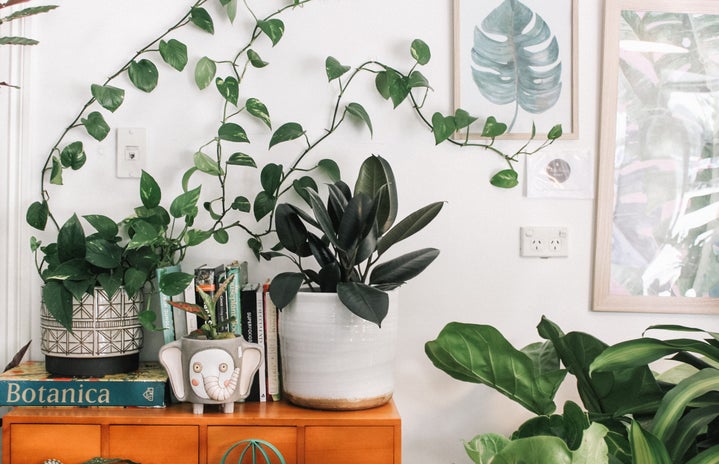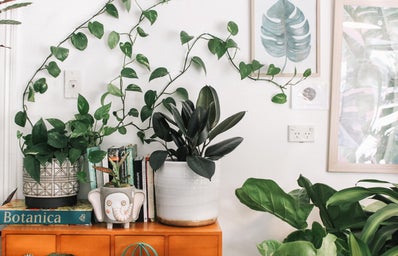How to become a plant parent, for those of us without a green thumb.
I’ll be honest with you. Before two weeks ago, I’d killed every plant I’d ever owned. I genuinely thought that “dirt” and “soil” were the same thing, and I’d never heard of propagating in my life. As the succulents cycled through, I made the executive decision to give up on my fantasies of owning a greenhouse and admit that I was only disgracing mother nature. I threw out my plant carcasses and moved on with my life—until recently when my roommate took me to a nursery.
I’ve come to realize that my inability to maintain a plant cannot just be blamed on my lack of a green thumb. My credentials on giving plant advice are nonexistent, but in these past two weeks of motherhood I’ve managed to collect some bits of knowledge that have made the ride a little bit easier. I promise that it’s possible to be a good plant parent without a natural disposition toward it, especially if you follow these tips.
- Tip #1: Prepare for parenthood.
-
As my wise, and mutually horticulture inept roommate put it, “caring for a plant is like an infant, you don’t know what it wants until it’s super dramatic about it.” Because every plant has different needs, make sure that you can provide these before you invest in one. Digging up and disposing of a plant corpse has a stronger psychological impact than you’d think, and I would recommend avoiding it at all costs. Live in a sunny place with a window that gets a great deal of direct light? Go online or ask a green thumb friend for advice on a plant type that thrives in this environment. Research helps a lot in this process, ensuring that you can steer clear of both wasting money and becoming a murderer.
Also, for those of us that feel the winds of travel (post-pandemic of course) calling, make sure you have a plant daycare on call. A friend or family member should work perfectly.
- Tip #2: Best the pests.
-
After a case of spider mites in our monstera, my house has felt the effect of poor pest management first hand. This journey begins the minute your new plant crosses the threshold, so make sure you are aware from the start. It is vital to keep the new plant in quarantine (a term we are all too familiar with) away from the rest of your collection for at least a few weeks in order to minimize any possible cross contamination. The satisfaction that you get from immediately displaying the newcomer next to the others is not worth a small bug infestation; nothing is. Neem oil is helpful too.
- Tip #3: Find the balance.
-
Cards on the table, I used to think that succulents, being from the desert, needed zero water at all to survive. I learned my mistake after trying to move one from my desk and having to watch a cascade of dead leaves hit the floor. The three main components that go into plant care—water, oxygen, and sunlight—need a much more specific balance than I’d ever thought.
Just as underwatering is a crucial mistake, overwatering a plant can also be a death sentence. Same goes for sunlight; did you know that plants can get sunburnt too? Instead of being able to throw some SPF on them, though, we need to read care tips that educate us on how to give them access to the perfect amount of sunlight. No droopy leaves or crispy edges. Though it can be frustrating at times, learning how much care is too much care is an unavoidable part of plant parenthood. It’s definitely possible for novice plant owners to hit this stride, hopefully without too much trial and error, just as it’s natural to not find the balance immediately.
Plants are finicky and difficult, and very rewarding. They really are like little infants, constantly needing to be nurtured and given attention. The love that plant people feel for their collection is similar to that of any parent, and rightfully so. It is a huge accomplishment seeing your plants thrive, a feeling that I encourage everyone reading this to seek. You don’t need a natural green thumb to be successful, just some motivation and general care tips. But watch your wallet—once you get the hang of it, plants are addictive.


